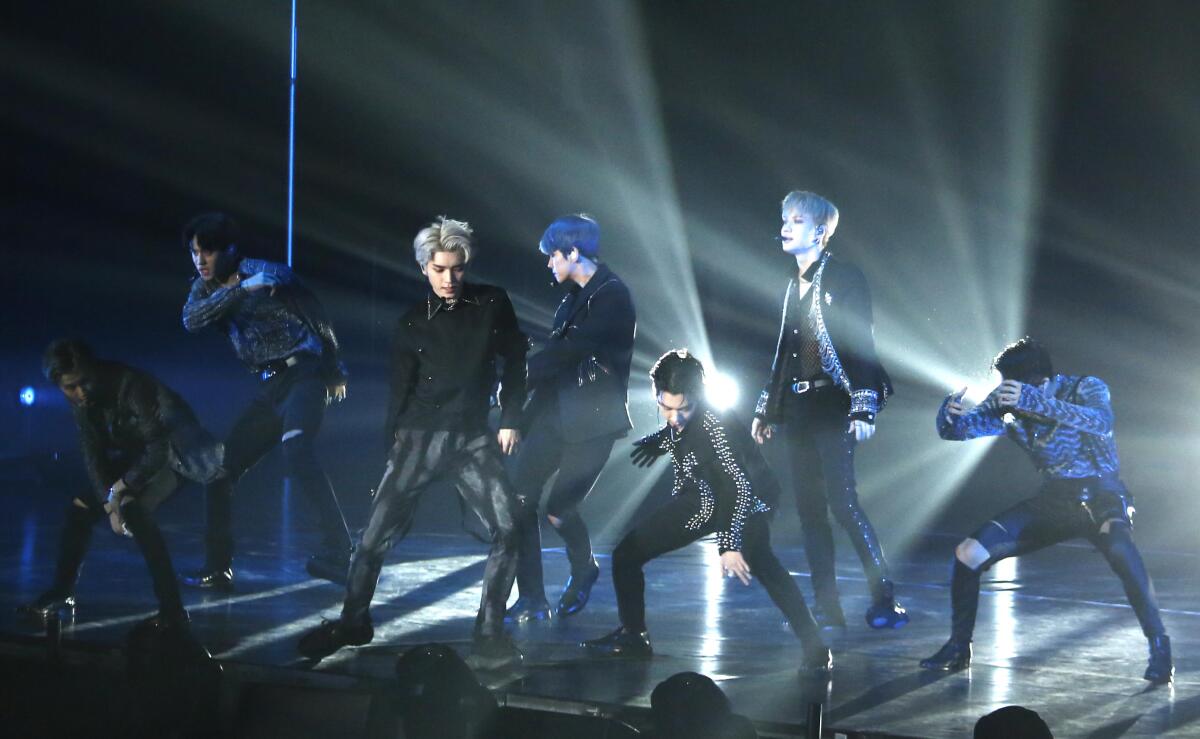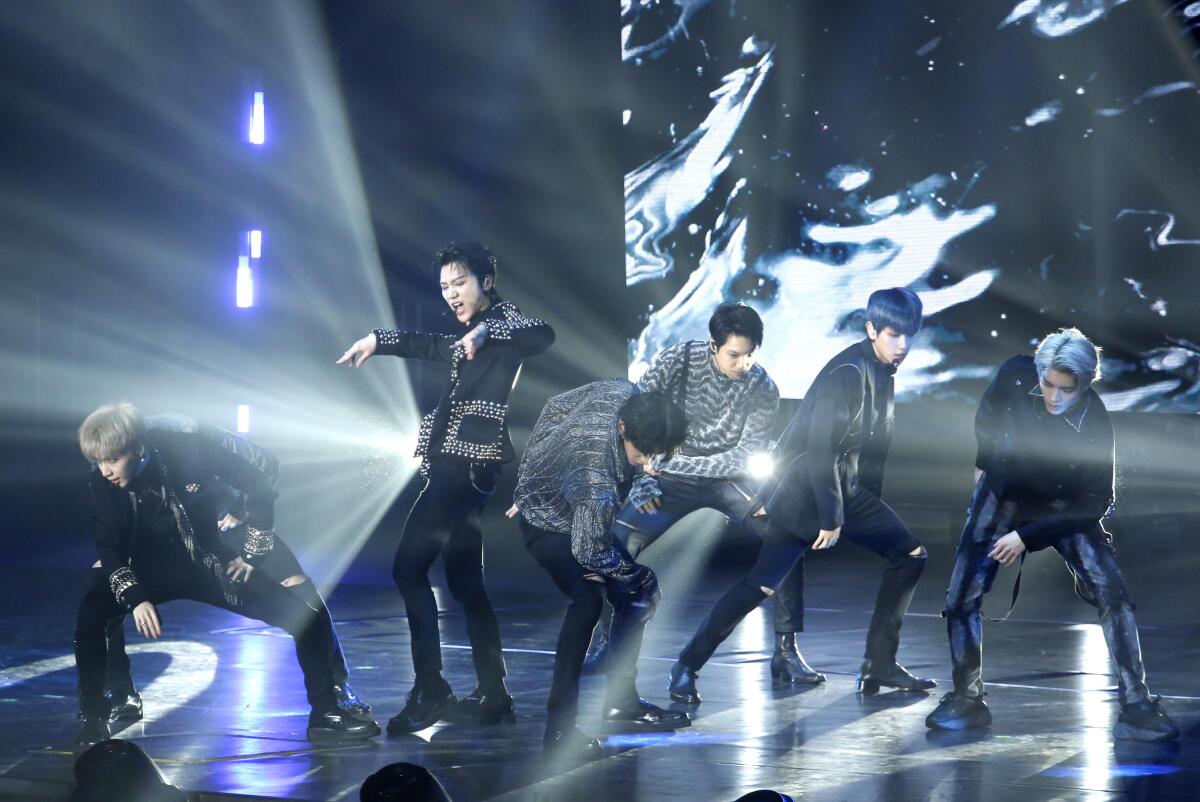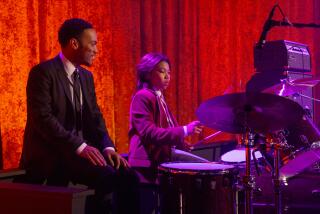Sold-out arenas, manic fandom: Will K-pop supergroup SuperM be the next BTS?

- Share via
Seven hours before the K-pop band SuperM took the stage for their sold-out show at the Forum last week, crowds were already packed outside the venue. No one needed to be there so early. The unseasonably hot weather sent sweat down fans’ faces — many covered with surgical masks, perhaps from coronavirus fears — and dampened their SuperM sweatshirts, SuperM T-shirts and SuperM proprietary lightsticks.
But thousands of young K-pop stans had waited months for this day, when an unprecedented supergroup of South Korea’s top pop stars would headline Los Angeles as part of a U.S. and worldwide arena tour.
The boys were just steps away, in fact, down the Forum Club stairs, past the giant portraits of Bob Dylan and Guns N’ Roses, in a windlowless backstage green room. There, SuperM’s Taemin, Kai, Baekhyun, Mark, Ten and Lucas (all early to mid-20s), kicked back on a gigantic couch, dressed in Balenciaga sweatshirts and high-streetwear bomber jackets. Their green, blue and bleach-blond hair fell over skin so flawless it looked like they’d had Instagram filters implanted.
Taeyong, the seventh, was a bit worse for wear, clutching his stomach in agony from an unspecified illness. He powered through the shivering to silently nod hello to a Times reporter, before beelining back to the dressing room to recover. Still, the band felt prepared for the night.
“I was really nervous when I first went on that stage, I actually didn’t have too much confidence,” Lucas said, about the band’s first-ever live show outside the offices of their U.S. label Capitol back in October (all members but Mark used a translator for English interviews). “A lot of the nervousness came from the fact that I really wanted to put my best foot forward. But now, I can definitely say I feel more confident about where I am.”

Super M’s only been a group for six months, but they were as surefire an idea as any in pop. Its members had been K-pop stars for nearly their whole lives, in the groundbreaking groups EXO, SHINee, NCT127 and WayV. In the wake of BTS’ rout of the U.S. pop charts and stadiums, SuperM is already tipped as the next phenomenon in K-pop, with four popular bands’ fan bases built in, and both Capitol and SM Entertainment, the most storied label in K-pop from founder Lee Soo-Man, behind them.
In October, the band set a record for debut week sales by a K-pop act, and topped the Billboard 200 album charts with their self-titled EP.
But they’ve also endured tragedy, including the 2017 suicide of Jonghyun, Taemin’s bandmate in SHINee. These seven young men, none older than 27, face the all-consuming demands of K-pop celebrity and an industry going through a time of profound self-reflection and change.
As they limbered up for this set — maybe the biggest show of their young careers in this band — they knew the stakes.
“This is basically like the re-debut for a lot of us,” Kai said. “There is some of that pressure and that expectation on us, because there was a kind of shock value to this group. This is going to be a different kind of stage.”

In K-pop, it’s common for bands to be modular. Groups often have sub-units or spinoffs to appeal to different markets like Chinese speakers. It’s especially helpful for boy bands, where superstardom is no insulation from compulsory military service in South Korea, and acts can be reconfigured to keep stars on the road.
But nothing like SuperM has happened in the genre before, where standout members of already superfamous bands joined forces. “The Avengers of K-pop” comparisons come up often, but maybe instead think of the 1992 U.S. Olympic basketball “Dream Team,” with seven-part harmonies and two-hour sets of impeccable choreography.
Even though all the members are in their twenties, in the ultra-compressed world of K-pop, SuperM is intergenerational. “I used to listen to SHINee before I even came to the label to train,” Mark, 20, said, looking over admiringly at his bandmate Taemin, 26. “To have our voices be harmonized together, and to be able to see him as a guy I know as a friend, that changes the way I listen to his music or see his performance.”
Being in the new band was also a chance to break out of the established roles in their main acts. “In EXO, I’m one of the youngest, but here I’m one of the oldest and that’s a really fun dynamic,” Kai, 26, said. “When I look at Lucas, I remember back when I first debuted and that makes me feel young again, like ‘Oh, I remember when I was like that too’.”
“Men get more attractive as they get older, so it’s kind of better to debut later,” 21-year-old Lucas joked, ribbing his bandmate in return.

SuperM isn’t diluted for Western tastes. But they are particularly rangy for K-pop: At their Forum show, Taemin, one of the older members and a K-pop veteran since 2008, sang pristine R&B on “Goodbye” and nailed every mark of a long, complicated solo dance. Kai’s trap-influenced “Confession” was the raciest number, punctuated by long flashes of abs that sent fans into paroxysms of lust.
“The genre as a whole is exploding over here,” said Tarynn Law, 27, who works at a music tech firm in Malibu and ponied up $175 for a floor seat to the Forum show. “Artists like Taemin and EXO haven’t toured here in quite some time or, in WayV’s case, at all, which makes SuperM’s love for the States pretty special for a lot of fans, too.”
The group’s new material — the purring melodic bounce of “No Manners” and the hard-pivoting EDM of “Jopping” (a goofy portmanteau of “Jumping” and “Popping”) — show an ear for K-pop sounds that can translate not just globally, but specifically on U.S. streaming and arena tours.
“I personally think that this group itself is not really westernized or altered at all for any type of market,” said Baekhyun. But he agrees that their sound challenges both K-pop and Western styles. “To be honest, when I first heard the song ‘Jopping,’ I thought it sounded a little bit too different. But now when I see the U.S. or the international fans’ reaction, it really made an impression on them. There was a bigger picture that Mr. Lee was thinking of.”
After helping to push NCT127 to the top tier of K-pop acts in the U.S., Capitol sees SuperM as both the most promising new bet in K-pop today, and the start of a deeper relationship with the Korean label SM Entertainment and its founder Lee Soo-Man, at 67 a titanic figure in South Korean business and culture (imagine Steve Jobs or Marvel’s Kevin Feige, if they’d invented a music genre that became their country’s most visible export).
Given K-pop’s uniquely devoted fan culture, where physical record sales are an expression of loyalty and fans camp out to buy $70 avant-garde sweatshirts, it’s no surprise that Capitol wanted to continue what “Mr. Lee,” as he is affectionately known in South Korea, had started.
“Like many music executives, I’ve watched with keen interest how K-pop’s immense popularity has been spreading around the globe,” Steve Barnett, the chairman and CEO of Capitol Music Group, said in an email. “I’ve certainly wanted to be in this space for a while, but I knew I had to find the right partner. Mr. Lee is an incredibly impressive and successful entertainment executive and creative force. Everything is first rate with his company and the artists he develops and brings to the world.”

Indeed, Mr. Lee, who hand-picked the members of SuperM, was at the Forum show, and when the camera panned to him in his suite, he was cheered as loudly as any star on stage. Given BTS’ “Saturday Night Live” and Grammy performances, Blackpink’s knockout set at Coachella last year and the reunion of veteran K-pop act BigBang this year at the same fest, the genre and its figureheads have never been more visible in the U.S.
But the squeaky-clean scene has, over the last few years, faced many of the same reckonings about overwork, toxic fan culture, misogyny and mental health that the wider entertainment industry has dealt with. Last year, K-pop was shaken by the suicides of two female stars, Goo Hara and Sulli, that thrust those long-simmering issues to the forefront.
Taemin knows that sense of tragedy more intimately than anyone. As a founding member of SHINee, he was devastated by the suicide of his bandmade Jonghyun in 2017. The loss shook K-pop as a whole, including all the members of SuperM. But Taemin lost a bandmate and close friend. He still struggles with how to speak about it, and when the topic came up, a Capitol rep encouraged him to be as honest as he felt comfortable with. He wanted to keep the personal pain of that loss private, he said, but acknowledged that speaking out on mental health issues in K-pop is the only way to effect change.
“When it comes to celebrities, it’s always kind of a double-edged sword. They’re loved by so many, but at the same time, they’re in the spotlight and everything they do is analyzed or scrutinize by so many people,” Taemin said. “But the industry is definitely changing for the better.”
In a few hours, they would walk out to a packed Forum and show fans what K-pop is capable of. For two hours, they demonstrated the virtuosity, musical range and physical craft that goes into a set pushing the peak of a genre. As a cultural phenomenon, K-pop has nothing left to prove in America anymore. Now it’s up to its acts to show what’s possible within it.
”It’s really encouraging to see how we can all bridge the gap, and everyone can just be part of a global music scene,” Kai said. “This shows us that K-pop is not just for K-pop fans anymore.”
More to Read
The biggest entertainment stories
Get our big stories about Hollywood, film, television, music, arts, culture and more right in your inbox as soon as they publish.
You may occasionally receive promotional content from the Los Angeles Times.











